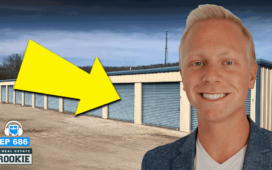Mortgage rates recently rose above 7% for the first time this year, bringing an already glacial housing market to a standstill. The news has hit investors like a horror movie jump scare after we’d thought the worst was behind us.
A robust economy is partly to blame. During the pandemic, when U.S. citizens feared rationing and mass unemployment, predicting our current economy would have been almost unthinkable.
In March, U.S. employers added over 300,000 jobs, and the Labor Department also reported that the unemployment rate had dipped from 3.9% to 3.8%, having remained below 4% for 26 straight months, the longest winning streak in over 60 years.
So, more jobs mean more money and more real estate deals, right? Wrong.
We’ve Gone From Five Potential Interest Rate Cuts to Maybe One
As we know, inflation is the cause of high interest rates. It still stands at a stubborn 3.5% after the rate hikes (after coming down from 9% post-pandemic, the Federal Reserve is aiming for 2%).
The robust economic outlook is the equivalent of letting the Fed have its cake and eat it, too. Had the economy stuttered, there would have been good reason to believe that the rate hike had a detrimental effect on businesses and that it was time to start lowering them. However, the opposite has happened, and real estate investors who might have hoped for five or rate cuts this year now have their fingers crossed that there will be one.
“They’ve got the economy right where they want it,” Mark Zandi, chief economist at Moody’s Analytics, told CNBC. “They are now just focused on inflation numbers. The question is, what’s the bar here?” My sense is they need two, probably three consecutive months of inflation numbers that are consistent with that 2% target. If that’s the bar, the earliest they can get there is September. I just don’t see rate cuts before that.”
Bank of America economist Stephen Juneau concurred, saying in a client note:
“We think policymakers will not feel comfortable starting the cutting cycle in June or even September. In short, this is the reality of a data-dependent Fed. With the inflation data exceeding expectations to start the year, it comes as little surprise that the Fed would push back on any urgency to cut, especially given the strong activity data.”
Many Renters Have Given Up on Owning a Home
High interest rates have put real estate investors between a rock and a hard place. Wait for rates to drop, and a lack of inventory could raise house prices. Buy an investment at a high interest rate now and kiss cash flow goodbye, potentially putting investors in a tough spot once vacancies and repairs are factored in.
Many renters have given up on the idea of ever owning a home, according to a January survey by property management firm Entrata, which found that 20% of those surveyed don’t expect to ever own a home, a 33% increase from 2021. Many of these renters are financially stable and could afford a home if they wanted, but prefer the flexibility renting offers—particularly with job uncertainty and remote work.
A February survey by Opendoor Brokerage—a technology firm specializing in buying and selling real estate—revealed that 46% of renters would not consider buying a home unless rates fell below 5%.
A Buying Pause Is a Golden Opportunity
However, simply waiting for rates to fall below 5%—which, let’s face it, currently seems about as likely as finding peace in the Middle East—does not mean there will be an abundance of homes to purchase. There is still a chronic shortage of inventory. It’s estimated the U.S. currently has a shortfall of over 7 million homes. It will take a long time for builders to fill that gap.
Current homebuyers are buying because they need to—after new babies, new jobs, or divorces. This pause in the market and increase of long-term renters means that there has probably never been a better time in recent years for savvy investors to buy. However, in the current market, it can only be done with a long-term goal in mind.
Practical Moves to Get Your First Investment Property
Despite the high rates, there are some practical moves new investors can make now to put themselves in a good position for the future.
A caveat: None of these ideas are new or involve assuming a mortgage, creative financing, or liquidating assets. Neither are they reliant on a super-high income or loans from wealthy family members. And most are not easy options for everyday working middle-class Americans with jobs and limited time who are looking to shore up their financial future by owning rental real estate.
Rent, don’t buy a personal home
If you are contemplating buying a home for yourself or a rental, adding personal debt with a high-interest rate mortgage won’t help your investment chances.
According to a recent Lending Tree study, it’s currently cheaper to rent in many markets than buy. Renting will not only help your debt-to-income ratio when qualifying for a mortgage on an investment property, but also enable you to make a down payment on an investment, increasing its chances of cash flow.
Increase your income
A higher income offsets the financial hurdles of being a landlord while also helping you qualify for a better mortgage rate. Whether you need to Airbnb a room or two in your personal residence, aim for a promotion at work, or take on some kind of side hustle, having more money has never been a better problem solver.
Lower your expenses
Another easier-said-than-done piece of advice, but this goes hand-in-hand with increasing income. No one is expecting you to adopt the brutal austerity moves of the FIRE movement and altogether forgo a trip to Starbucks now and again.
Lowering expenses could mean moving to a more affordable location—a must if you work remotely—or forgoing eating out or pricey trips. It could also mean moving in with a family member or having roommates. Calculate how much money you need to start your investment journey, and work backward from there to make it happen.
House-hack a small multifamily investment
This old-school method puts a roof over your head and allows you to qualify for an FHA 3.5% down loan. The money you save on paying for rent or a personal loan by having your tenants pay some or all of your mortgage is equivalent to having a cash-flowing investment property. It’s an ideal building block to launch your investment career.
Final Thoughts
Although many seasoned real estate investors are quick to cite that interest rates were over 7% 20 years ago, the headwinds facing investors today are that wages have not kept pace with house prices or rents. That means the nation is increasingly cost burdened, spending more than 30% of its monthly income on housing.
That is both a gift and a curse for new investors looking to buy their first rental. It’s a gift because the tenant pool is expanding, and there is limited investment competition. It’s a curse because it is tough to get on the other side of the fence and find a good rental property in a high-interest rate, low-inventory market.
Becoming an investor now—without creative financing, wealthy relatives, or hitching your hopes to a guru or syndicator—comes down to basic saving, cost-cutting, and being educated about the existing loan products available to help you get started.
In short, it means doing what many others are not prepared to do. There’s no magic bullet, but it’s doable. It comes down to making tough choices to succeed.
Ready to succeed in real estate investing? Create a free BiggerPockets account to learn about investment strategies; ask questions and get answers from our community of +2 million members; connect with investor-friendly agents; and so much more.
Note By BiggerPockets: These are opinions written by the author and do not necessarily represent the opinions of BiggerPockets.
















